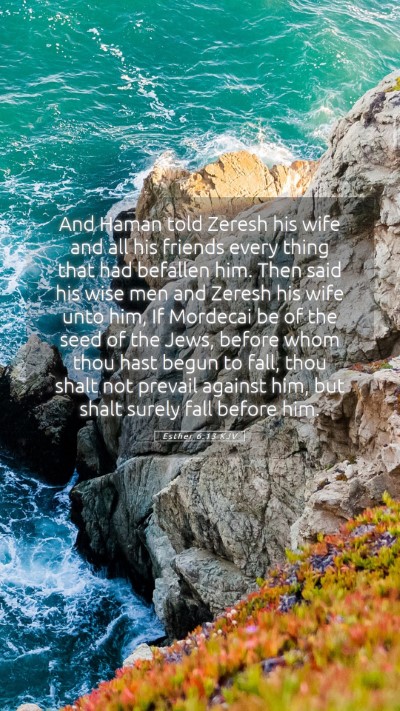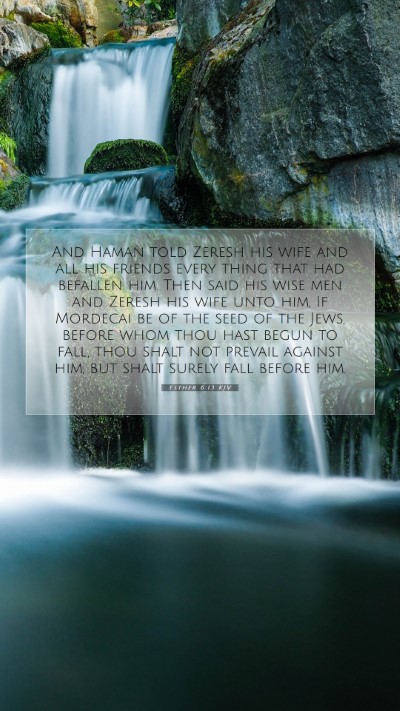Old Testament
Genesis Exodus Leviticus Numbers Deuteronomy Joshua Judges Ruth 1 Samuel 2 Samuel 1 Kings 2 Kings 1 Chronicles 2 Chronicles Ezra Nehemiah Esther Job Psalms Proverbs Ecclesiastes Song of Solomon Isaiah Jeremiah Lamentations Ezekiel Daniel Hosea Joel Amos Obadiah Jonah Micah Nahum Habakkuk Zephaniah Haggai Zechariah MalachiEsther 6:13 Meaning
What is the meaning of Esther 6:13?
And Haman told Zeresh his wife and all his friends every thing that had befallen him. Then said his wise men and Zeresh his wife unto him, If Mordecai be of the seed of the Jews, before whom thou hast begun to fall, thou shalt not prevail against him, but shalt surely fall before him.
Esther 6:13 Bible Verse Meaning
Bible Verse Meaning of Esther 6:13
Esther 6:13 states: "And Haman told Zeresh his wife and all his friends everything that had befallen him. Then his wise men and Zeresh his wife said to him, 'If Mordecai, before whom you have begun to fall, is of Jewish descent, you will not prevail against him but will surely fall before him.'" This verse delineates a critical moment in the narrative, focusing on the reactions and realizations of Haman following the events surrounding Mordecai and the impending doom he faces.
Insights from Public Domain Commentaries
The collective insights from Matthew Henry, Albert Barnes, and Adam Clarke provide a rich understanding of this verse. Below, we summarize key interpretations and observations.
Contextual Overview
In the larger context of the Book of Esther, Haman’s predicament highlights the turning tide of fate where his plans against Mordecai come back to haunt him. The verse serves as a stark reminder of the providence of God and the ultimate justice that prevails.
Commentary Insights
-
Matthew Henry:
Henry notes Haman’s sense of desperation and impending defeat as he communicates with his wife and friends. The gathering reflects Haman's reliance on worldly wisdom, which ultimately fails him. Haman's acknowledgment of Mordecai’s Jewish heritage signals the spiritual undertone of the conflict.
-
Albert Barnes:
Barnes emphasizes the significance of the Jewish identity of Mordecai and suggests that Haman's fate is intertwined with his animosity towards the Jewish people. He interprets Haman's downfall as an illustration of pride preceding destruction, affirming the biblical principle seen in Proverbs 16:18.
-
Adam Clarke:
Clarke provides a detailed analysis of the interactions between Haman and his wise men, viewing them as a reflection of Haman's isolation. The counsel from Zeresh and his friends to recognize Mordecai’s heritage reveals the acknowledgment of divine providence, foreshadowing Haman's tragic end.
Thematic Analysis
This verse encapsulates several themes including:
- Divine Providence: The notion that God is ultimately in control, and that Haman cannot succeed against Mordecai due to God’s favor upon the Jews.
- Pride and Humility: Haman's pride leads to his downfall, demonstrating a biblical principle about the consequences of arrogance contrasted by the faithfulness of Mordecai.
- Destiny and Fate: The unraveling of Haman's plans signifies that human efforts to thwart God’s purposes are in vain.
Application to Daily Life
The insights gained from Esther 6:13 can be applied to personal situations in contemporary life:
- Recognizing that pride may lead to downfall; humility and faith can result in eventual vindication.
- Understanding the importance of aligning one's actions with divine purposes, especially in conflicts.
- Finding comfort in the belief that no unjust plan can succeed against those who are considered righteous in the eyes of God.
Cross References
This verse can also be understood in relation to several other scriptures:
- Proverbs 16:18: "Pride goes before destruction, and a haughty spirit before a fall."
- Psalms 21:11: "Though they intended evil against You and devised a plot, they will not succeed."
- Esther 7:10: "So they hanged Haman on the gallows that he had prepared for Mordecai. Then the king’s wrath was abated."
Conclusion
Esther 6:13 encapsulates a pivotal moment that leads to the unraveling of Haman’s plot against Mordecai and the Jewish people. Through the commentaries of Matthew Henry, Albert Barnes, and Adam Clarke, and by exploring its themes and applications, we gain comprehensive bible verse meanings, bible verse interpretations, and practical bible study insights. This scripture serves not only as a historical account but also as a profound lesson in the dynamics of pride, justice, and divine sovereignty.


